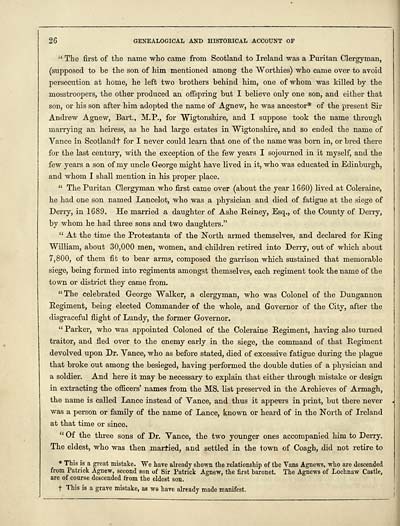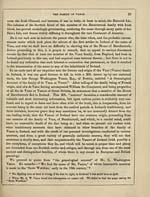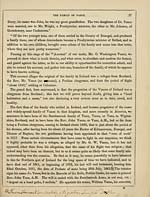Download files
Complete book:
Individual page:
Thumbnail gallery: Grid view | List view

26 GENEALOGICAL AND HISTORICAL ACCOUNT OP
•' The first of the name who came from Scotland to Ireland "was a Puritan Clergyman,
(supposed to be the son of him mentioned among the "Worthies) who came over to avoid
persecution at home, he left two brothers behind him, one of whom was killed by the
mosstroopers, the other produced an offspring but I believe only one son, and either that
son, or his son after him adopted the name of Agnew, he was ancestor* of the present Sir
Andrew Agnew, Bart., M.P., for "Wigtonshire, and I suppose took the name through
marrying an heiress, as he had large estates in Wigtonshire, and so ended the name of
Vance in Scotlandt for I never could learn that one of the name was born in, or bred there
for the last century, with the exception of the few years I sojourned in it myself, and the
few years a son of my uncle George might have lived in it, who was educated in Edinburgh,
and whom I shall mention in his proper place.
" The Puritan Clergyman who first came over (about the year 1660) lived at Coleraine,
he had one son named Lancelot, who was a physician and died of fatigue at the siege of
Derry, in 1689. He married a daughter of Ashe Reiney, Esq., of the County of Deny,
by whom he had three sons and two daughters."
" At the time the Protestants of the North armed themselves, and declared for King
"William, about 30,000 men, women, and children retired into Derry, out of which about
7,800, of them fit to bear arms, composed the garrison which sustained that memorable
siege, being formed into regiments amongst themselves, each regiment took the name of the
town or district they came from.
"The celebrated George Walker, a clergyman, who was Colonel of the Dungannon
Eegiment, being elected Commander of the whole, and Governor of the City, after the
disgraceful flight of Lundy, the former Governor.
" Parker, who was appointed Coloned of the Coleraine Regiment, having also turned
traitor, and fled over to the enemy early in the siege, the command of that Regiment
devolved upon Dr. Vance, who as before stated, died of excessive fatigue during the plague
that broke out among the besieged, having performed the double duties of a physician and
a soldier. And here it may be necessary to explain that either through mistake or design
in extracting the officers' names from the MS. list preserved in the Arohieves of Armagh,
the name is called Lance instead of Vance, and thus it appears in print, but there never
was a person or family of the name of Lance, known or heard of in the North of Ireland
at that time or since.
" Of the three sons of Dr. Vance, the two younger ones accompanied him to Derry.
The eldest, who was then married, and settled in the town of Coagh, did not retire to
* This is a great mistake. We have already shown the relationship of the Vans Agnews, who are descended
from Patriok Agnew, second son of Sir Patrick Agnew, the first baronet. The Agnews of Lochnaw Castle,
are of coarse descended from the eldest son.
t This is a grave mistake, as we have already made manifest.
•' The first of the name who came from Scotland to Ireland "was a Puritan Clergyman,
(supposed to be the son of him mentioned among the "Worthies) who came over to avoid
persecution at home, he left two brothers behind him, one of whom was killed by the
mosstroopers, the other produced an offspring but I believe only one son, and either that
son, or his son after him adopted the name of Agnew, he was ancestor* of the present Sir
Andrew Agnew, Bart., M.P., for "Wigtonshire, and I suppose took the name through
marrying an heiress, as he had large estates in Wigtonshire, and so ended the name of
Vance in Scotlandt for I never could learn that one of the name was born in, or bred there
for the last century, with the exception of the few years I sojourned in it myself, and the
few years a son of my uncle George might have lived in it, who was educated in Edinburgh,
and whom I shall mention in his proper place.
" The Puritan Clergyman who first came over (about the year 1660) lived at Coleraine,
he had one son named Lancelot, who was a physician and died of fatigue at the siege of
Derry, in 1689. He married a daughter of Ashe Reiney, Esq., of the County of Deny,
by whom he had three sons and two daughters."
" At the time the Protestants of the North armed themselves, and declared for King
"William, about 30,000 men, women, and children retired into Derry, out of which about
7,800, of them fit to bear arms, composed the garrison which sustained that memorable
siege, being formed into regiments amongst themselves, each regiment took the name of the
town or district they came from.
"The celebrated George Walker, a clergyman, who was Colonel of the Dungannon
Eegiment, being elected Commander of the whole, and Governor of the City, after the
disgraceful flight of Lundy, the former Governor.
" Parker, who was appointed Coloned of the Coleraine Regiment, having also turned
traitor, and fled over to the enemy early in the siege, the command of that Regiment
devolved upon Dr. Vance, who as before stated, died of excessive fatigue during the plague
that broke out among the besieged, having performed the double duties of a physician and
a soldier. And here it may be necessary to explain that either through mistake or design
in extracting the officers' names from the MS. list preserved in the Arohieves of Armagh,
the name is called Lance instead of Vance, and thus it appears in print, but there never
was a person or family of the name of Lance, known or heard of in the North of Ireland
at that time or since.
" Of the three sons of Dr. Vance, the two younger ones accompanied him to Derry.
The eldest, who was then married, and settled in the town of Coagh, did not retire to
* This is a great mistake. We have already shown the relationship of the Vans Agnews, who are descended
from Patriok Agnew, second son of Sir Patrick Agnew, the first baronet. The Agnews of Lochnaw Castle,
are of coarse descended from the eldest son.
t This is a grave mistake, as we have already made manifest.
Set display mode to:
![]() Universal Viewer |
Universal Viewer | ![]() Mirador |
Large image | Transcription
Mirador |
Large image | Transcription
Images and transcriptions on this page, including medium image downloads, may be used under the Creative Commons Attribution 4.0 International Licence unless otherwise stated. ![]()
| Permanent URL | https://digital.nls.uk/95676887 |
|---|
| Description | A selection of almost 400 printed items relating to the history of Scottish families, mostly dating from the 19th and early 20th centuries. Includes memoirs, genealogies and clan histories, with a few produced by emigrant families. The earliest family history goes back to AD 916. |
|---|

